#Keeping Company with Sondheim
Explore tagged Tumblr posts
Note
rank every production of: company and follies, then rank every performance of
- not getting married today
- ladies who lunch
- being alive
- losing my mind
- could i leave you
- (anything else.)
What do you *mean* every performance? There's unhinged and there's batshit unstable because fuck's sake, how is this even possible? I'm putting it all under a cut. We're going to be here a while.
Okay, so given that I've only ever seen the recent Broadway revival of Company live, and otherwise only have a passing familiarity with the original and the two other subsequent revivals, I'll say that the real answer is Elaine Stritch best Joanne, Katie Finneran best Amy, Jennifer Simard best Sarah, and objectively Raul Esparza best Bobby. And that's all I have to say about that.
Follies: 1. Encores! 2007 for that sublime trio of Donna Murphy as Phyllis, Vicki Clark as Sally, and Christine Baranski as Carlotta. However, points off for not being a full maximalist design (y'know, being an Encores! and all). 2. Original 1971. Yes, there have been more talented performers, yes there have been better sets, yes it was kind of a nightmare to put together. But I've read Everything was Possible and I am deeply besotted by what was. 3. NT 2017. For the design and some of the background direction, full honors. That set is everything I have ever wanted from a Follies set. Gorgeous costumes. Love the execution of the ghosts. The actual performers...? Well...let's just say I can count on one hand how many West End performers I actually respect. 4. 2011 Broadway revival. Jan Maxwell, my beloved. The design may not have been as grand as it should have been, the casting of Bernadette might have been a little underwhelming, the drama backstage might have been harrowing, but Jan Maxwell may well be the best Phyllis we've ever had in a full production. 5. 1998 Papermill Play House. There were rumors of this transferring to Broadway but that got axed, alas. Instead, we got the 2001 production (starring neither rumored Donna Murphy nor Jean Smart, so what was the point?). But Dee Hoty is one of the great Phyllis performers. She did "Ah, But Underneath" instead of "The Story of Lucy and Jessie" and you know, I'm not mad about it. Honorable Mention: the Follies concert this past June at Carnegie Hall. It's been enough time that I can make up a laundry list of what I didn't like. But what I did like made for a magical night.
As for ranking the songs, you're getting my top three-to-five and you'll be happy about it:
"Getting Married Today" 1. Madeline Kahn Hands down, no question, zero contest, everyone else pack it up. This is it. The pinnacle of the song. She is everything and her "I'm not well" runs on constant loop in my head. 2. Katie Finneran Truly an ideal role for her, and this rendition is as nerve-wracking as it should be. Extra points for being post-partum and leaking breastmilk into that white dress. 3. Veanne Cox I've seen her do this live, and it's an impressive feat. She's got the neurotic panic down to a science. 4. Julie Andrews Do I think it's anywhere near the best rendition ever? No. But am I endlessly entertained? Absolutely. Julie Andrews, my beloved. 5. Marin Mazzie (technically) You never said it had to be the Amy part of the song. Marin Mazzie as the soprano Wedding Singer deserves a spot on this list, and while the video I'm thinking of seems to have vanished into the aether, there are a few clips of her doing it at different concerts, and I think of them fondly.
"The Ladies Who Lunch" 1. Patti LuPone But not the one she did for the recent Broadway revival. It was fine and all, but not her best. I do like the 2011 concert version, but I'm going with the Ladies in Red version specifically here. 2. Elaine Stritch The original. The blueprint. The ideal. 3. Christine Baranski, Meryl Streep, Audra McDonald It's iconic and feral and I don't think anyone's going to argue. 4. Debra Monk and/or Barbra Walsh I don't listen to them often, but solid takes either way.
"Being Alive" 1. Marquee Five I've said it before, and I'll say it again, but this song was only ever just kind of there for me until I heard an alto woman sing it. Now I get it. Obscure choice, yes, but argue with the wall. 2. Raul Esparza Okay, so I did hear him do this live during an unexpected appearance at a 24 Hour Plays event, and okay yeah, I get it. I understand the hype. It was incredible. Other than that, I don't really listen to others aside from Marquee Five.
"Losing My Mind" 1. Marin Mazzie This is everything to me. The gown, the silhouette, the sheer size of her mouth. And the little gasp at the end? I am in a puddle on the floor. 2. Kate Baldwin The pause at the climax of the song is one of the singular most transcendent moments of live theatre I have ever experienced. Total silence as nearly three-thousand people witnessed utter perfection. I am haunted by this performance. 3. Victoria Clark The best Sally, and I'll die on that hill. She gets it. And her costume, hair, and makeup for the 2007 Encores! concert has me so in love. Almost enough to make me overlook how delusional she is and propose marriage. 4. Liza Minnelli Yes, in case you didn't know, there's a Liza Minnelli disco version of this song, and I just... I... yeah, you're going to have to see for yourself.
"Could I Leave You?" 1. Donna Murphy Shocker. Who would have guessed that DroughtofApathy would put Donna Murphy's definitive rendition of this song at the top slot? She goes somewhere during this number, and I haven't seen a performance come close to touching what she does yet. 2. Jan Maxwell My beloved.
But let's be honest here. I'm not listening to any other version aside from Donna's. So here's just a few I think are very good, but given the choice, I'd never voluntarily listen to any of them if Donna is also an option: Julie Andrews, Dee Hoty, Emily Skinner, Alexis Smith, Janie Dee, Lucia Spina, Bonnie Milligan. Basically any woman. (Though I'll be honest, I didn't really care for Beth Leavel's during the Follies concert.) No man ever. Every time a man does this number at a cabaret, just know that beneath my mask, I am hissing and spitting in disgust.
And that's all she wrote.
#sondheim#follies#company#i could keep ranking things all night but it's after midnight and i want to be asleep
0 notes
Text
Interview with Backstage (2024)

Jonathan Bailey is still marinating in his thoughts, andthey taste pretty sweet. Top notes of red wine, he says.
These are busy times for the witty British heartthrob. He’s speaking over Zoom from Malta, where he’s filming the next “Jurassic World” installment. And two days prior, he received his first Emmy nomination for his supporting turn on Showtime’s “Fellow Travelers.”
What’s lingering in Bailey’s mind after reaching such a huge milestone? “The nature of the story, and how that story’s come to be told,” he says of Ron Nyswaner’s limited series, a decades-spanning gay drama that’s chock-full of steamy sex scenes. For him, the Emmy nod is “an acknowledgment of [the show] meaning something much bigger.”
The 36-year-old actor radiates humility and surges with pride for his collaborators; “Fellow Travelers” also picked up nominations for lead actor Matt Bomer and for Nyswaner’s writing. Bailey believes the fact that executive producer Robbie Rogers was able to get the project on television at all is a “brilliant signifier” of changing times. He feels lucky to have been the right person for the job. And after a couple of decades in the industry, the actor’s star is about to go supernova.
Childhood stage work and gigs on 2000s teen TV shows led to roles on acclaimed series like ITV’s “Broadchurch” and Channel 4’s “Crashing.” He nabbed an Olivier in 2019 for his performance in Marianne Elliott’s West End revival of “Company.” Households on the other side of the Atlantic learned his name in 2020 when he courted lockdown audiences as Anthony, the strident head of the titular family on Netflix’s period-romance smash “Bridgerton.”
Then came the game-changing “Fellow Travelers.” Bailey plays the idealistic Tim Laughlin, a closeted congressional staffer who pursues a clandestine relationship with another man amid the witch hunts of McCarthy-era Washington. The actor is keeping up that momentum in the coming months with part one of Jon M. Chu’s highly anticipated film adaptation of the Broadway musical “Wicked” (out Nov. 22), followed by the fourth “Jurassic World” in 2025.
“Fellow Travelers” is a fitting inflection point for Bailey, considering it reflects aspects of his own gay identity. Tim’s story also illuminates a thread connecting the actor’s work, both in and out of character: always embracing the truth, shame be damned.
Born in Wallingford, England, Bailey made a beeline for the arts as a kid when he began studying music and ballet. After getting a taste of performing at a young age, he secured an agent when he was a teenager. Even now, he feels the sense of joy and wonder he discovered in those early days.
He chose not to attend drama school, instead throwing himself into professional theater, where he encountered the performance process in its most essential form. “You start with your own instincts, and then you share with others in the room in real time,” Bailey says. “You academically approach text, then you emotionally explore it. Then, you physically put it on its feet.”
Theater taught him to be observant. In rehearsals, he witnessed actors being brilliant and bold, but also making crucial mistakes. Weeks of rehearsing helped him learn how to spend time with a character as he watched his castmates play against type and expand themselves through performance. Those lessons both tested and encouraged him, and they’ve carried him throughout his career.
Since then, Bailey has gotten the chance to see plenty of giants at work. He reverently discusses performing Stephen Sondheim’s music alongside Patti LuPone in “Company” and reciting Shakespeare opposite Ian McKellen in the Chichester Festival Theatre’s 2017 production of “King Lear.”
His contemporaries also made for great teachers. He worked with Phoebe Waller-Bridge on “Crashing” and Michaela Coel on “Chewing Gum”—two certified television geniuses whose creative successes Bailey likens to the magnesium flame of a meteor. It’s an apt comparison—Waller-Bridge called him ��a meteorite of fun” in a 2022 interview with GQ. (“I think I’ve always been quite naughty,” he says playfully.)
“There’s so much you take on via natural osmosis,” Bailey explains. “It’s what you watch and how you interpret things.”
For example, he thinks that every actor should see Sandy Dennis’ Oscar-winning turn as Honey in Mike Nichols’ 1966 film “Who’s Afraid of Virginia Woolf?” Her performance whet his curiosity about the craft: “She is so fluid. I mean, that might be the most exposing answer I’ve given about what my inner world is like.”
Bailey’s technique is rooted in music. He plays piano and clarinet, and he approaches acting like an instrument, too. When reading a script for the first time, he experiences his character’s arc as the phrases in a song. “The way my brain works is that I see the images of what they’re doing,” he says. “When I say ‘phrasing,’ it’s like, how you get from that image to this image.”
When he was playing the bottled-up Anthony on “Bridgerton,” Bailey found inspiration in songs by Echo and the Bunnymen and Nirvana. While filming “Fellow Travelers” in Toronto, he went on long walks while listening to expansive pop music to help him explore Tim, a character whose energy radiates outward.
Considering Bailey’s process plays like a song, connoisseurs of his work might notice a motif. Sam from “Crashing,” a party boy Bailey calls “a wild, untamed animal in a tiny little cage,” aggressively maintains a facade of heterosexuality while pining for his male housemate Fred (Amit Shah). On Season 2 of “Bridgerton,” Anthony locked himself into a prison of duty and a loveless engagement to avoid acknowledging his desire for the fiery Kate Sharma (Simone Ashley).
Tim of “Fellow Travelers” is the latest in a series of sharply drawn characters confronting the tension between their assigned roles and their personal truths. Viewers first meet a straitlaced rule-follower whose Catholic piety is only matched by his loyalty to the infamous Senator Joseph McCarthy. All that changes when he crosses paths with Hawkins “Hawk” Fuller (Bomer), a crystal-eyed, debonair State Department official. Their respective closets combust on contact, and they enter into a forbidden love affair just as McCarthy’s Lavender Scare has begun purging queer people from the halls of government.
Bailey’s interior work tends to be more emotional than cerebral, but he’s a generous conversation partner who’s always game to riff on the deep stuff. Whether it’s yearning, going against expectations, or facing high stakes, the phrasing is what draws him in.
He finds a lot of gorgeous notes to play across the eight episodes of “Fellow Travelers” as the action moves from the 1950s to the ’80s, making pit stops along the way. While Hawk settles for a life of straight domesticity, Tim hurtles through a sexual and political awakening: The Beltway boy becomes an activist priest who refuses to diminish himself, especially when the AIDS crisis begins to rip his community apart.
Bailey loved being inside Tim’s head; in fact, the actor thinks of him as a hero. After experiencing the isolation of his secret relationship with Hawk, he opens himself up to the world: He comes out, moves to San Francisco, cobbles together a found family, and builds a life as his true self.
“Ron Nyswaner has spoiled Matt and me for the operatic detail that existed between [our characters],” Bailey says, “and also with Tim’s political fervor: the truth and the honesty that he demands of himself and the world around him, and the grappling with anything that is an obstacle to his own and other’s happiness.”
You can’t talk about “Fellow Travelers” without discussing its rapturous sex scenes—and not only for titillation’s sake, though the kinky encounters between Tim and Hawk certainly call for smelling salts. These sequences gave Bailey the opportunity to commit authentic queer intimacy to the screen, which members of the LGBTQ+ community rarely come across as they search for ways to understand their identities.
The trust between Bailey and Bomer informed everything they did onscreen. Before filming those scenes, the two actors talked through their approach at a café (Goldstruck Coffee on Cumberland Street in Toronto—a ribald little detail that still makes Bailey laugh). The filming itself was incredibly technical, and the actors worked with an intimacy coordinator on set. “We sort of hit the ground running, knowing exactly what was going to be required but also how to communicate throughout it,” Bailey says. “It felt immediately quite safe.”
He sensed an exciting opportunity to tell a story about transformative love amid the “wild, oppressive moment” of the Lavender Scare, dismissing any reservations about the explicit nature of the material. “Honestly, this is exactly why this show is going to be brilliant,” he remembers thinking.
The series’ milestone dramatic moments, with buttons still done up and no skin showing, carried that same sense of significance. No matter how much Tim grew over the course of his arc, Bailey says that his bond with Hawk remained an “extraordinary, material thing.”
This summer, the actor made a very Tim move when he founded the Shameless Fund, a charity that supports LGBTQ+ causes under the tagline: “Raising cash. Erasing shame.” The initiative grew directly out of his acting work—first inspired by the platform afforded to him by “Bridgerton” and further influenced by his experience on “Fellow Travelers.”
Playing Tim—or, as Bailey puts it, spending “five months doing a dissertation on queer oppression and liberation”—catalyzed his thoughts about the people who created a world where such a show could even exist. “I think in ‘Fellow Travelers,’ it’s so clear what Tim wants,” he says. “But as the world around him develops, you realize there’s so much that he can’t have, but that he can help change.”
Bailey sees that progress playing out in the next generation. He has a small role on the upcoming third season of Netflix’s queer YA hit “Heartstopper” as a dreamy academic who’s the celebrity crush of the series’ protagonist, Charlie (Joe Locke). Based on creator Alice Oseman’s graphic novel series, the show has found a passionate following of young LGBTQ+ fans.
When he watched “Heartstopper” for the first time, Bailey remembers wondering what it would have been like to see such representation on television when he was growing up. “I was so celebratory of it,” he says. “But it was obviously kind of a melancholic watch for people above a certain age, because it allowed them to grieve what they didn’t have.”
Having conquered the Regency and Cold War periods on the small screen, Bailey’s blockbuster era is imminent. He’s playing dashing love interest Fiyero in the “Wicked” films (based on Gregory Maguire’s 1995 novel), singing and dancing alongside Cynthia Erivo and Ariana Grande. It’s a perfect fit for the actor’s particular lens: “Musically and theatrically, I understand it massively.”
Since “Wicked” came with its own well-known songs to study, Bailey spent a lot of time with composer-lyricist Stephen Schwartz’s music in his ears rather than Kurt Cobain’s. He explored Fiyero’s interiority through the musical theater form itself: What does the act of singing express for him?
And for a character whose signature number is called “Dancing Through Life,” what metaphorical direction are his steps leading him in?
Bailey sees Fiyero as part of the same club as Tim, Anthony, and Sam, as the heightened world of Oz sends him on a journey of radical transformation. “I think about where he starts and where he ends up; he’s literally a changed person,” the actor says. “I savored the arc over two films.”
Next year, Bailey will become an action star in Gareth Edwards’ next installment of “Jurassic World” opposite Scarlett Johansson. Though details have yet to be announced, including the movie’s title, production is well underway; Bailey just finished filming in Thailand before shooting moved to Malta. A few days before we spoke, he was interacting with a fake blue-screen dinosaur (which is only a spoiler if you thought Hollywood has actually been cloning big reptiles this whole time).
But Bailey is still keeping his theater muscles toned. Next year, he’s starring as the titular monarch in Nicholas Hytner’s production of Shakespeare’s “Richard II” at London’s Bridge Theatre. “I have to go and sharpen up,” he says of returning to the stage. “You feel so sharp and dexterous at the end of a theater run—but also, you know, without a soul. Carcass levels of absolute exhaustion.”
Bailey lights up at the prospect of getting back onstage and experiencing the kinetic energy between the actors, crew, and director. He believes that the emotional and intellectual rigor of theater leads to a tight, specific piece of work. It’s an art form that requires continuous creation night after night.
This stamina comes in handy in front of a camera, too. “When you’re exhausted, you have to rely on technique,” he explains. “Technique does get you over the finish line, and you can deliver a performance that is honest and tell the story effectively and truthfully.”
Until then—and until he’s back on set with those fake dinosaurs—he’s going to soak up that Emmy-nomination afterglow for a little while longer.
“I’m actually going to go and have another glass of wine to celebrate,” he says.
Source
#jonathan bailey#jonny bailey#fellow travelers#wicked#wicked movie#theatre#backstage#backstage interview#interviews#interviews:2024#NEW!
57 notes
·
View notes
Text
sondheim/furth's company should have stayed a retroactive period piece. when it premiered in 1970, it was set in present day and there have been several revisions since, even before the gender swapped "bobbie version". the idea is to update the setting to present day, which is fine i guess, but frankly stuff like changing "look i'll call you in the morning or my service will explain" to "i'll call you in the morning or i'll TEXT YOU and explain" or references to the seagrams building changing the infamous "drag" rhyme, is just the theatrical version of the "landlord special". the cultural references and plot points of company are so, so, so early 70s.
if bobby turned 35 in the year 1970, he was born in 1935. if bobby turned 35 in 1995, he was born in 1960. if bobbie turned 35 in 2020, she was born in 1985. the differences in generations/ages between these bobbies is not insignificant.
smoking weed might be a new and exciting experience for 30 somethings in the 1970s, but that's not really necessarily the case for someone who graduated high school in 1978 or 2003. the whole karate scene isn't really something that would happen in the "modern era".
the lyrics to "the ladies who lunch" describe women reading copies of time magazine ("just to keep in touch") and going to matinees of pinter plays (there were four total broadway productions of harold pinter plays between 2010 and 2020). they lounge in caftans and goes to classes in optical art and drinks vodka stingers. the woman joanne describes would be "of a certain age" in 1970, but elderly in 2020. at this point, sondheim should have rewritten the lyrics to reference botox and spanx, but at this point, they should have just written an entirely original musical.
just keep Company set in the original time period and watch it as a period piece, reflect on things that haven't changed and things that have.
56 notes
·
View notes
Text
So I was just watching the Shakespeare in Park Hamlet (2023) free on PBS til June 30th
and anyway, I realized for the first time that "cudgel thy brains" is also in Hamlet so technically Jonathan Harker quoted Shakespeare twice in dire straits
20 notes
·
View notes
Text
Good Omens Aziraphale's Sad Bastard Breakup Playlist
After the breakup, Aziraphale has a new job in heaven, having taken Gabriel’s vacant position. Aziraphale is haunted by sad music reminding him of his time with Crowley. The songs are dramatic, tragic, melancholic, angry, wistful, romantic, and sentimental. How does he listen to music at his new job in the head office? Are material objects allowed? Does he keep a secret stash of tea, cake, and records and a phonograph player in his office? Does he have a celestial radio that can tune in Earth radio stations? Does he sneak off to Earth to hang out in record shops and bookstores? Or more dramatically and emotionally torturously, does he remember every note, every nuance, every feeling, of every song and replay them in his mind? He's stuffing his face with angel food cake and tea while crying and listening to sad bastard songs and hiding from Michael and the Metatron.
See note after list on song selection process.
Songs include:
“Lacrimosa” – Mozart, Requiem in D Minor, Vienna Mozart Orchestra
“Commendatore” – Mozart, Don Giovanni, Amadeus film soundtrack
“Ja, tot katoramu vnimala” – Rubenstein, The Demon, Nicolai Ghiaurov
“D’amour l’ardente flemme” – Berlioz, The Damnation of Faust, Maria Callas
“Liebestod” – Wagner, Tristan and Isolde, Waltraud Meier
“Ach ich fuhls” – Mozart, The Magic Flute, Gundula Janowitz
“Thy hand, Belinda … When I am laid in earth” – Purcell, Dido and Aeneas, Janet Baker
“E lucevan la stelle” – Puccini, Tosca, Placido Domingo
“Celeste Aidia” – Verdi, Aida, Mario Lanza
“Ich bin der Welt abhanden gekommen” Mahler, Dietrich Fischer-Dieskau
“Der Wanderer” – Schubert, Dietrich Fischer-Dieskau
“Love is a Plaintive Song” – Gilbert and Sullivan, Patience, D’Oyly Carte Opera Company
“I am a Courtier Grave and Serious” – Gilbert and Sullivan, The Gondoliers, D’Oyly Carte Opera Company
“The Gentleman is a Dope” – Rodgers and Hammerstein, Allegro, Blossom Dearie
“A Hymn to Him” – Lerner and Lowe, My Fair Lady, Rex Harrison
“Could I Leave You?” – Sondheim, Follies, Alexis Smith
“We Do Not Belong Together” – Sondheim, Sunday in the Park with George, Bernadette Peters and Mandy Patinkin
“On My Own” – Schonberg, Les Misérables, Frances Ruffelle
“As Long as He Needs Me” – Bert, Oliver, Judy Garland
“Stranger in Paradise” – Wright and Forest, Kismet, Richard Kiley and Doretta Morrow
“A Nightingale Sang in Berkeley Square” – Sherwin and Maschwitz, Vera Lynn
“Night and Day” – Porter, The Gay Divorcee, Ella Fitzgerald
“I’ve Got You Under My Skin” – Porter, Born to Dance, Shirley Bassey
“Bewitched, Bothered, and Bewildered” – Rodgers and Heart, Pal Joey, Sarah Vaughan
“They Can’t Take That Away From Me” – Gershwin, Shall We Dance, Fred Astaire
“Mon Deu” – Dumont and Vaucaire, Edith Piaf
“Non, Je Ne Regrette Rien” – Dumont and Vaucaire, Edith Piaf
P.S.: Aziraphale likes Les Mis because it reminds him of that time Crowley rescued him from the Bastille. Don't tell anyone. It's a big secret.
P.P.S.: “Bewitched, Bothered, and Bewildered” reminds him of the time he and Crowley got drunk in the backroom at the bookshop the day the anti-Christ was delivered to Earth. Basically, this song reminds him of every time they went out for drinks or stayed in and drank.
P.P.P.S.: “I am a Courtier Grave and Serious” was the song Aziraphale planned to play when trying to tempt Crowley into learning the gavotte. It reminds him of the ball in the bookstore when he finally danced with Crowley.
P.P.P.P.S.: “Non, Je Ne Regrette Rien” is as close as Aziraphale can get to telling the world and Crowley to eff off. He has no more effs to give. Or at least he’s trying to convince himself he no longer gives a f***. He’s going off to his new job at the head office and Do Good.
Note on song selection:
I selected songs that thematically fit with the relationship between Aziraphale and Crowley. I think the songs tell a story of Aziraphale’s struggle to reconcile his conflicted motivations. They reflect Aziraphale’s fears and desires. He fears being hauled off to hell for disobedience. He fears Crowley’s death and being alone in the world. He desires to be emotionally intimate with Crowley. (Dare he risk physical intimacy with Crowley?) He feels self-righteously indignant, but he’s soft and squishy and weepy and misses his best friend.
I don’t have much knowledge of opera or musical theater, but I have some experience with choir and solo performance. I did a lot of research into opera, art songs, musicals, showtunes, and standards to create a playlist on YouTube. Selections were based on availability, popularity, and sound quality. My big question was whether or not Aziraphale is a strict originalist or if he likes different versions of songs. In some places, I chose newer versions over original versions due to the sound quality of the recordings. I tried to keep selections accessible to a wide audience with varying degrees of musical knowledge. You may not like my choices, so your mileage may vary. You can make your own playlist.
You can listen to it on YouTube.
#good omens 2#neil gaiman#aziraphale#crowley#breakup#sad bastard music#angry love songs#breakup playlist#playlist
25 notes
·
View notes
Text
back on my Company revival bullshit but in my defence, good god. it’s an absolute masterclass in causing you to notice little ways in which we incorporate gendered assumptions in stuff - just by noticing all the unchanged lines that play differently or sit oddly once you’ve changed the main character’s gender.
(if you’re just joining us, the current revival of Stephen Sondheim’s musical about relationships, Company, swaps out the gender of the lead role, Bobby (and also Bobby’s casual partners, and one of Bobby’s many married friends, making that couple a gay couple), while keeping most everything else the same.)
one i’m currently rotating in my mind (from You Could Drive a Person Crazy) is that - I don’t know that I’d ever have thought about this otherwise - it strikes me that men, and not women, are ever conventionally referred to in a dating context as “attentive.”
the line is:
So single and attentive and attractive a chick is anything a person could wish
and.. yeah. That’s weird, isn’t it? if you agree with me anyway, by all means say if you don’t!
but i wonder why women in a relationship are not ‘attentive.’ I feel like (esp in the original 1970s idiom) it’s something to do with the notion that ignoring a partner is a kind of bad behaviour we expect from men, so it makes sense to comment positively that a guy is attentive - whereas, stereotypically, the kinds of bad behaviour we expect from women in a relationship tend more towards a surfeit of attention (nagging, needy).
anyway i’ve always found Bobby very relatable and cool as a woman who is bad at relationships in a slightly conventionally male-coded way.
speaking of this song, it’s also entertainingly surprising to have a bunch of guys complaining that a woman is definitely giving them all the (noted as good) sex they could ask for, but just won’t commit emotionally.
31 notes
·
View notes
Text
The twist in Assassins was so good, the way it was staged when I saw it literally started laying the foundation for the reveal from before the show even started
And the show gives you enough answers that you can fill in the gaps incorrectly and then it keeps you busy jumping back and forth thru time so you can never double check if your answers make sense. Overall it's a very weird show so in many ways you're constantly playing catch up and by the time I felt like I had the basics down and was backfilling my own knowledge onto the show so I could anticipate what happened next and i finally realized what was what and who was who right as the scene of the reveal started
Minus the reveal, the same thing happens in Company. Sondheim gives you a series of vignettes and he says "hears a series of vignettes" and you eat one and it's delicious and you eat the second one and it's different and delicious and you're thinking "wow Sondheim is the goat" as you eat the third and fourth and fifth and you can't tell anymore if you're noticing a similar flavor in each of them because they're so different or if the aftertaste of the last one is overlaying the current one because the songs are packed so densely that you can barely breath between them and you finish and say "thank you Sondheim, you're the goat" and you shift in your seat and wipe the sweat off your brow and the last song makes you tear up and you see the emotional plotline wrap up even tho there was no story plotline
#and then they cast a former child star in the revival and it wins a Tony#sondheim#assassins musical
7 notes
·
View notes
Text
im trying to keep my focus but i might have to expand out to be a general sondheim/musical blog because i can only listen to sweeney todd like 8009018012938120 times in a row before slightly swerving off course and listening to company, or for exampel, shrek the musical
8 notes
·
View notes
Text
Crowley and Aziraphale seeing Sondheim's musical Company
Soooo this interview happened where Michael and David describe a perfect night out together for Aziraphale and Crowley.

Michael suggests two Sondheim musicals, and that got me thinking about Aziraphale and Crowley going to see Company.
Here's how I think that would go.
Crowley would indeed keep up a continuous monologue about how awful and pointless the musical is. Endless comments about how Cole Porter's lyrics are better (and so were his parties).
At every repetition of, "I'll drink to that," in Ladies Who Lunch, he toasts the performer and sips Talisker from the pocket flask he smuggled into the show.
But then they get to the song Being Alive.
Aziraphale weeps openly, angelic tears running down his cheeks that he tells himself are from being moved by the beauty of the music and the emotion of the performance and not at all about his own feelings.
But then he notices Crowley's gone quiet. No witty commentary or snarky one-liners.
youtube
Lyrics excerpt:
Somebody need me too much Somebody know me too well Somebody pull me up short And put me through hell And give me support For being alive Make me alive Make me alive
Make me confused Mock me with praise Let me be used Vary my days
But alone Is alone Not alive
Somebody crowd me with love Somebody force me to care Somebody let come through I'll always be there As frightened as you To help us survive Being alive
Aziraphale glances to his side and sees Crowley's posture is still a blasé serpentine sprawl but instead of perpetually in motion he's gone completely still, watching with rapt attention. Profile visible in the refracted blue stage lights, Aziraphale sees Crowley's nose wrinkle in a sniff and his hand come up to hastily swipe away a traitorous teardrop that's escaped from under his sunglasses and made a break for it down his face.
Aziraphale doesn't say anything, but when Crowley's arm settles back on the armrest between them he reaches out and clasps Crowley's fingers in his own. Gives a little squeeze. Crowley squeezes back. No words are spoken, but they understand each other perfectly.
#good omens#aziracrow#aziraphale x crowley#crowley x aziraphale#ineffable husbands#good omens headcanons#good omens s2 interview#michael sheen and david tennant being the best#michael sheen#david tennant
25 notes
·
View notes
Text
spock would be a sondheim queen but would consider it an embarrassing human weakness that hes like too moved by the music like if anybody sees the single tear rolling down my face during a traveling players stop over production of company on the enterprise as we take them to the next planet to keep them safe from the evil glow cloud trying to kill one of their members it will be over for me i can never show my face in public again if anyone knows i have feelings about the musical theater but once in a while he will drop a lyric or two just to keep people on their toes like looking very thoughtful after a surprisingly successful mission dealing with psychic death flowers and would gaze off and say to quote the old earth expression doctor one might say everything is coming up roses and kirks like why spock i didnt know you had it in you and they all laugh end episode
5 notes
·
View notes
Text
More on the pressure gauge
@eclare1000 I just posted on this, in terms of what the metaphor might mean and I realised there is another meaning which should have been staring me in the face - the sexual one!
This was triggered by reading this line from the hospital corridor:
"If you feel like company you can ring me up."
I don't know when company became a byword for something else (as in the Stephen Sondheim musical) but, well there is this from Bunny threatening to throw Laurie out of the car:
"I should hate to force my company on anyone who felt like that about it."
And now I'm seeing it everywhere in that little hospital scene. Ralph gives him his number (he's a gentleman, he doesn't ask for Laurie's). And he says 'There's nothing difficult or complicated or anything. I'm there when you want me.' And suddenly that sounds not like an offer of friendship, but an offer of something with no strings, as described by Laurie after the Wedding Night:
"He had offered all he had, as simply as a cigarette or a drink, for a palliative of present pain."
And then to Laurie 'What a silly boy you are.' which he says 'as if someone were flirting with him at a party' which is interesting - not as if he is flirting but as if someone is flirting with him.
I think this might be a parallel to when Laurie keeps inadvertently giving signals to Ralph at the Wedding. I am sure Ralph is not *actually* trying to proposition Laurie, but everything he says seems to have a double meaning.
Or perhaps Mary is just having a lot of fun with her readers.
But anyway - sometimes you have to let off that steam, Laurie!!
16 notes
·
View notes
Text
yknow, I'd seen people say things to the effect of "The Ladies Who Lunch is kind of an odd song in Company, every other song is about romantic relationships and this one song is randomly about upper-middle class new york women as a species" and I'd just kinda gone "huh yeah that is weird," and like, you read Finishing The Hat (the book not the song) and Sondheim talks about how he wrote the song and the character of Joanne specifically for Elaine Stritch, and not about how the song fits into Company as a whole, so you say "ok he made this song for Elaine Stritch and that's why it doesn't really fit with the rest of the show" but like... it DOES fit. I realized why just tonight while listening to it.
The start of the song is Joanne sarcastically tearing into her peers for their silly little routines and foolish little lives, and then she turns her scathing eye on herself: "and here's to the girls who just watch / aren't they the best / when they get depressed it's a bottle of scotch / plus a little jest / another chance to disapprove / another brilliant zinger / another reason not to move / another vodka stinger" (emphasis mine). This is so clearly about Bobby. The whole show up to this point, he's been watching other people's relationships, drawing his own conclusions and reasons why he can't commit emotionally. Even as he dates people and desperately asks Amy to marry him, he's remaining emotionally distant, stagnant, while all his friends let themselves marry and grow in and out of relationships. Similarly, Joanne is detached from the society she critiques in her song. The point that The Ladies Who Lunch gets to by the end is that Joanne is not a neutral third party, she's not above it all, and her sitting back and laughing at these ladies is worthy of the same scorn she gives their trivial worries. And as a fellow outsider, she can understand Bobby more than his other friends, and she's in the unique position to push him towards understanding that his passivity and tight grip on his heart have consequences, and that playing it safe and non-committal in love will keep him from forming the deep emotional connection he craves. and I think that's pretty neat. Joanne is a cool character
#maybe this is pretty obvious but i literally just hadn't thought about it like that before even once#i love realizing new things about musicals i love#not to say that joanne and bobby's situations are the same#joining his friends in willingness to love and marry may be the right decision for bobby#but i don't think TLWL is saying joanne should be a normal nyc upper middle class woman#anyways listen to the 2006 cast recording with raul esparza it's the best one#sondheim#company#musical theater
19 notes
·
View notes
Text
Okay so I was taking a bath with a fizz as you do and suddenly it hit me:
What if Steven Sondheim’s Company but it’s the Company of Thorin Oakenshield
Bobby is Bilbo, obviously. And I feel like possibly Ori should be Amy/Jamie because I feel like he could embody that neurotic spiral. Maybe Fíli could be Paul.
Nori is probably Joanne based on saltiness. Or possibly Oín is, and Nori and Dwalin are the couple who gets divorced and keeps living together after.
Either way “ladies who lunch” is about Thranduil now.
The birthday party naturally happens under the Party Tree.
“where you going?” / “Minas Tirith” / “Oh.”
…actually you know what this started out as a joke but “Being Alive” is kind of perfect for Bilbo in a sad way that makes me think of him living alone in Bag End for 80 years I MEAN marrying Thorin and becoming the Hobbit Queen of Erebor or whatever so there’s that.
Also my bath is cold now so bye
17 notes
·
View notes
Text
Here's a link to the liner notes for the Merrily We Roll Along cast recording, including the essays from Maria Friedman and Ben Brantley. It was recorded on 15, 16 and 27 October.
Part of Ben Brantley's message:
Instead of forcing a high-concept framework onto Merrily, Friedman chose to work entirely from within the existing script and score, mining each note and word for their deepest emotional content. “As the actor or the director,” she has said, “you put in the humanity, and the complexity in the humanity, beneath the cleverness.” Friedman selected actors who brought their own glow of humanity to their characters’ self-sabotaging ambivalence.
For the ambitious Franklin Shepard, a composer-turned-movie-producer, she chose the charismatic, eminently likable Groff (a Tony nominee for Spring Awakening and Hamilton). And a figure once dismissed as a narcissistic cad is now the pulsing, rueful heart of a show that now seems to be taking place within his memory.
Radcliffe, who has evolved into a fine stage actor in the years since Harry Potter, brings an electric, energizing obsessiveness to the playwright Charley Kringas. And Mendez, a Tony winner for Carousel, is the trio’s essential fulcrum as the defensively sharp-tongued Mary Flynn, a novelist and drama critic. Reg Rogers, Krystal Joy Brown and Katie Rose Clarke provide meticulously thought-through portraits of characters who registered as caricatures in earlier productions.
Listen to Groff giving voice to circular thought in “Growing Up,” or Radcliffe performing the propulsive “Franklin Shepard, Inc.,” or Mendez leading “Now You Know,” and you hear a fully textured, singular personality emerge in song. When they do the trio “Old Friends,” its ricocheting reversals of feelings leave you dizzy. The great Jonathan Tunick, who orchestrated the original Merrily, performs the same duties here. And his work makes a case for this as one of Sondheim’s most involving scores, one that trembles with conflicted feelings.
Friedman and company have so fully embraced Merrily, without judgmental distance, that we wind up identifying with every one of its principal characters, even at their most selfish and short-sighted. Unlike previous versions, this Merrily isn’t about how love and ideals are lost. It’s about how they endure, to prod and sting us and keep us alive.
Yes, Merrily breaks our heart. But as befits an unresolved show that after many years in the shadows has finally come into its own, it finds a radiant hope within the darkness.
#jonathan groff#lindsay mendez#daniel radcliffe#merrily we roll along#cast recording#ben brantley#maria friedman
16 notes
·
View notes
Text
Theatre Deep Dive: David Tennant in Hurlyburly (1997)
In today's spotlight on David Tennant's theatre career, we'll feature 1997's production of Hurlyburly by David Rabe, and David's role as Mickey.
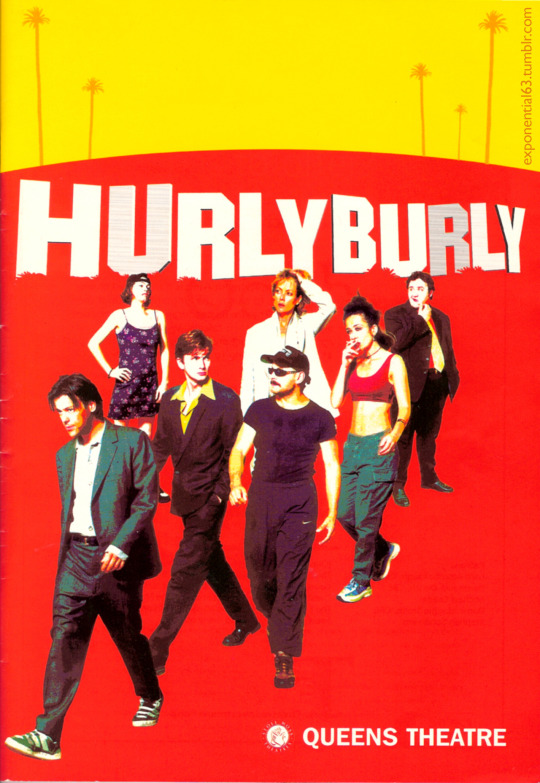
By 1997, David was coming off two years of successful theatre. In 1995 he'd been nominated for Best Supporting Actor in the MENTA Awards and Best Actor at the British Regional Theatre Awards for his role as Kenny in An Experienced Woman Gives Advice.
In 1996 he'd completed four theatre roles: Tom Wingfield in The Glass Menagerie at the Dundee Rep, and Touchstone in As You Like It, Jack Lane in The Herbal Bed, and Alexander Hamilton in The General From America in Stratford and London for the Royal Shakespeare Company.
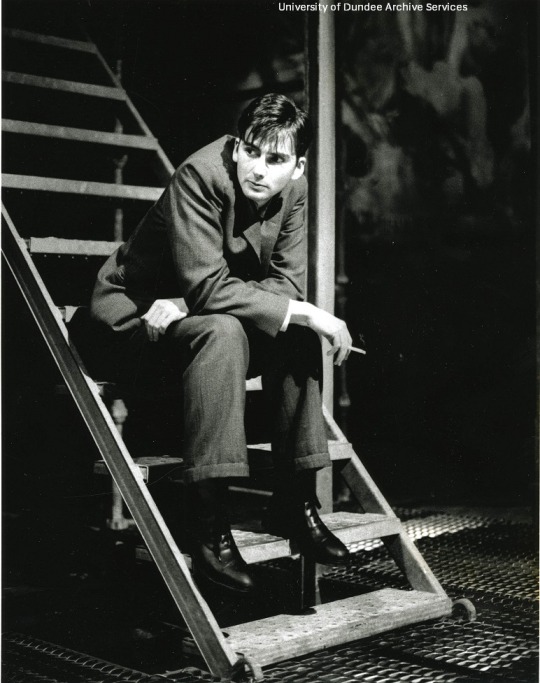
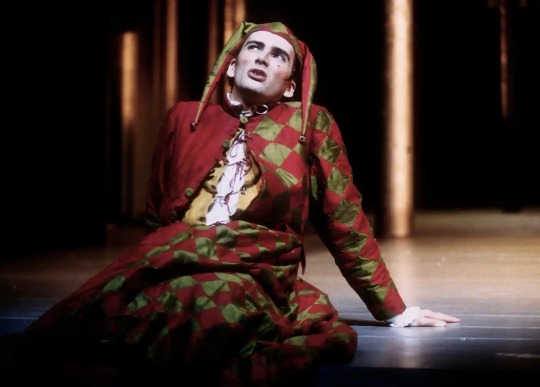
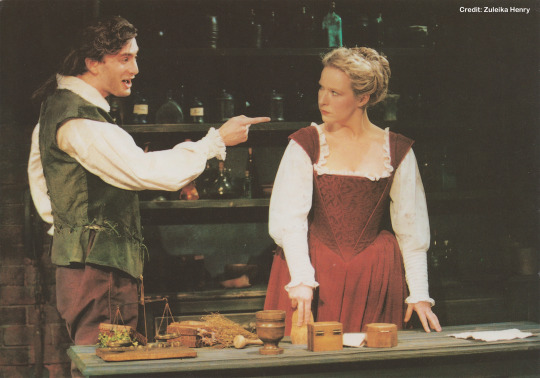
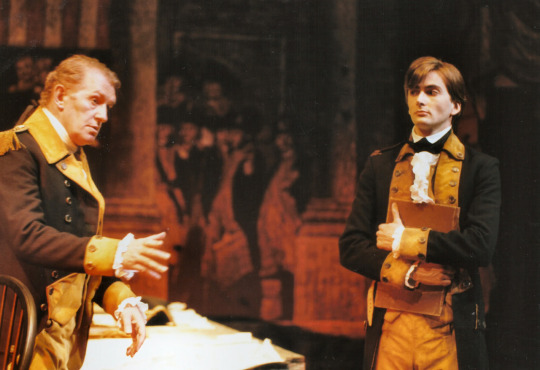
He took a day off from The Glass Menagerie rehearsals to go to London to audition for Orlando in As You Like It, and while he didn't get that role, he did bag the role of Touchstone. Follow this link if you want to read most of an extensive essay he wrote about playing that part...while he was playing it!
David won rave reviews for all these roles, including a Theatre Management Award nomination for Best Actor for 'The Glass Menagerie.' His Royal Shakespeare Company performances were all sell-outs, and in particular, his portrayal of Touchstone was noted as a standout performance. And while David had played many previous theatre roles, up to that point Touchstone had been the longest he'd played any part. He inhabited the role of Touchstone for almost an entire year - from 18 April 1996 (his 25th birthday) to the run's close on 29 March 1997. During the run, he'd injured his ankle.
Also, keep in mind he was simultaneously doing his other roles in The Herbal Bed and The General From America! The General From America ran from July to October 1996 in Stratford and from February to April of 1997 in London; The Herbal Bed ran from May to September 1996 in Stratford, and from October 1996 to January 1997 in London.
He was a BUSY boy indeed!
His next role - as Mickey in David Rabe's blisteringly caustic play Hurlyburly, would take him for the first time to the West End's Queen's Theatre (now the Sondheim Theatre). A transfer of the Peter Hall Company's March to April 1997 production at the Old Vic, the Queen's production would run from August to November 1997.
There's a belief in the DT fandom that David played the role of Mickey in both runs - at the Old Vic and at the Queen's. That's false. The only three actors who transferred their roles from the Old Vic were Rupert Graves as Eddie, Andy Serkis as Phil, and Susannah Doyle as Bonnie. David replaced Daniel Craig (yes, THAT Daniel Craig!) as Mickey. At the Old Vic, Stephen Dillane had played Artie, Elizabeth McGovern had played Darlene, and Kelly MacDonald (yes, THAT Kelly MacDonald!) was Donna. At the Queen's, Mark Benton played Artie, Jenny Seagrove played Darlene, and Jessica Watson was Donna.
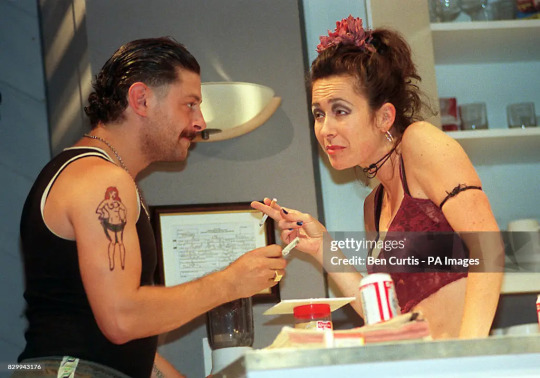
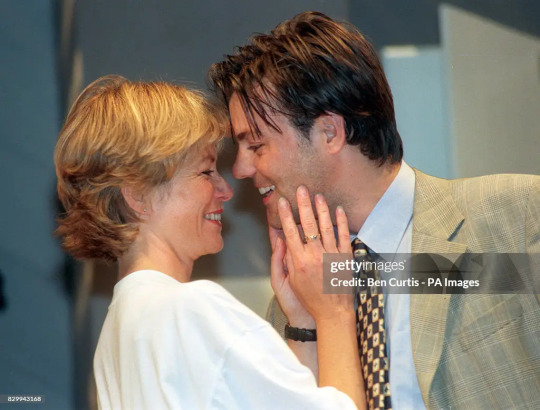
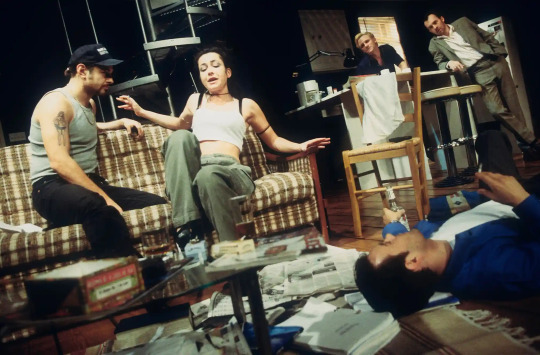
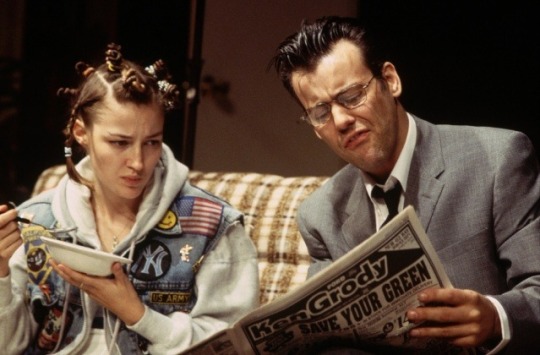
Photos of Hurlyburly from its Old Vic run
Weirdly, neither Graves nor Seagrove were supposed to star in the Queen's run. Ethan Hawke and Patsy Kensit were!
But Hawke - who would've made his London stage debut - walked out after a day's rehearsal and Kensit followed the next day. So Graves and Seagrove stepped in.
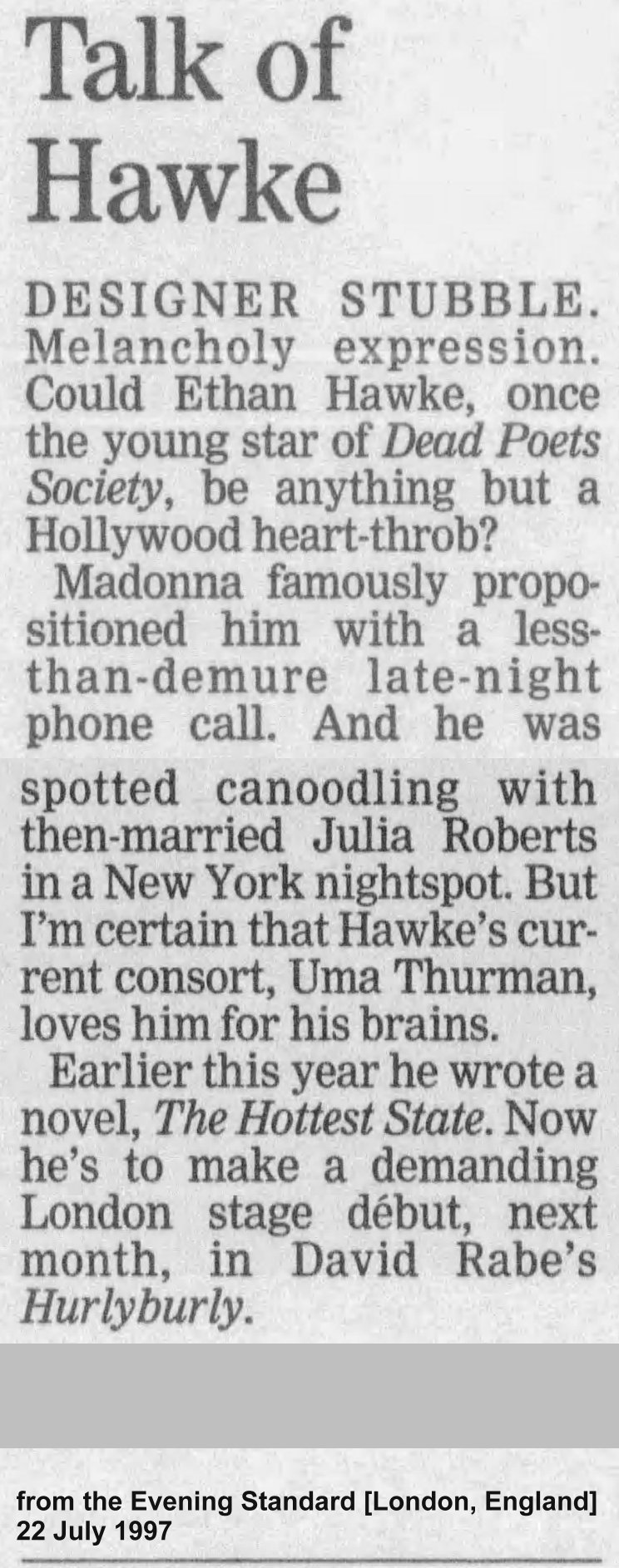
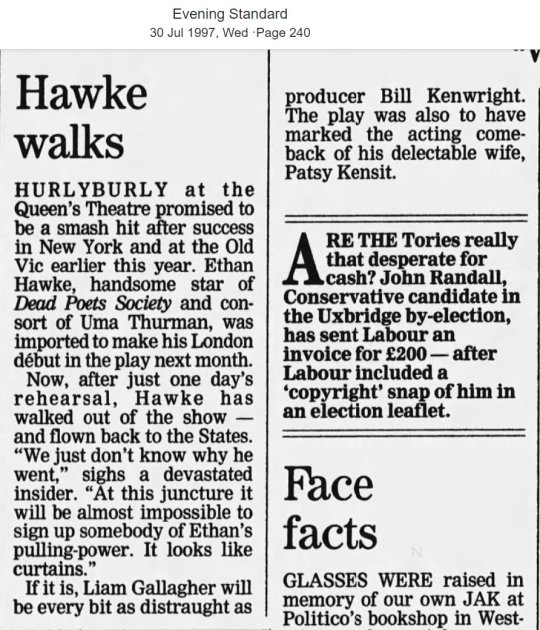
According to its programme, Hurlyburly was originally scheduled to begin previews on 14 August 1997. But because of its casting problems, it seems it began its run a week later, on 21 August? Yet newspapers give dates anywhere from 13 August to 28 August. So I'm really not certain of the exact date.
It was performed with American accents, too!
The director of Hurlyburly was Wilson Milam. Doctor Who fans will recognize the name, as Milam later went on to direct 2003's Scream of the Shalka - a well-known series, one where David featured in an uncredited cameo role as the Caretaker!
Hurlyburly ran for 2 hours and 40 minutes and began at 8pm on Mondays through Saturdays. There was one interval. Its weekday Wednesday matinee began at 3pm, and its Saturday matinee began at 4pm. Tickets ran anywhere from £7.50 to £24.
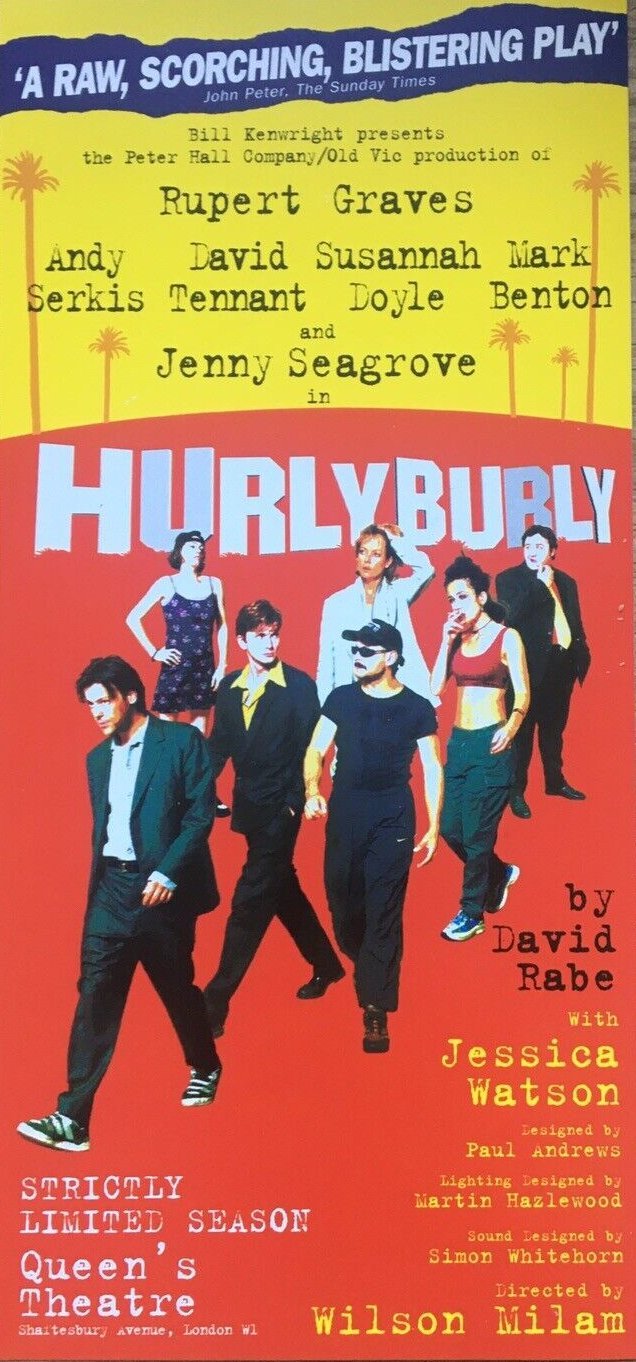
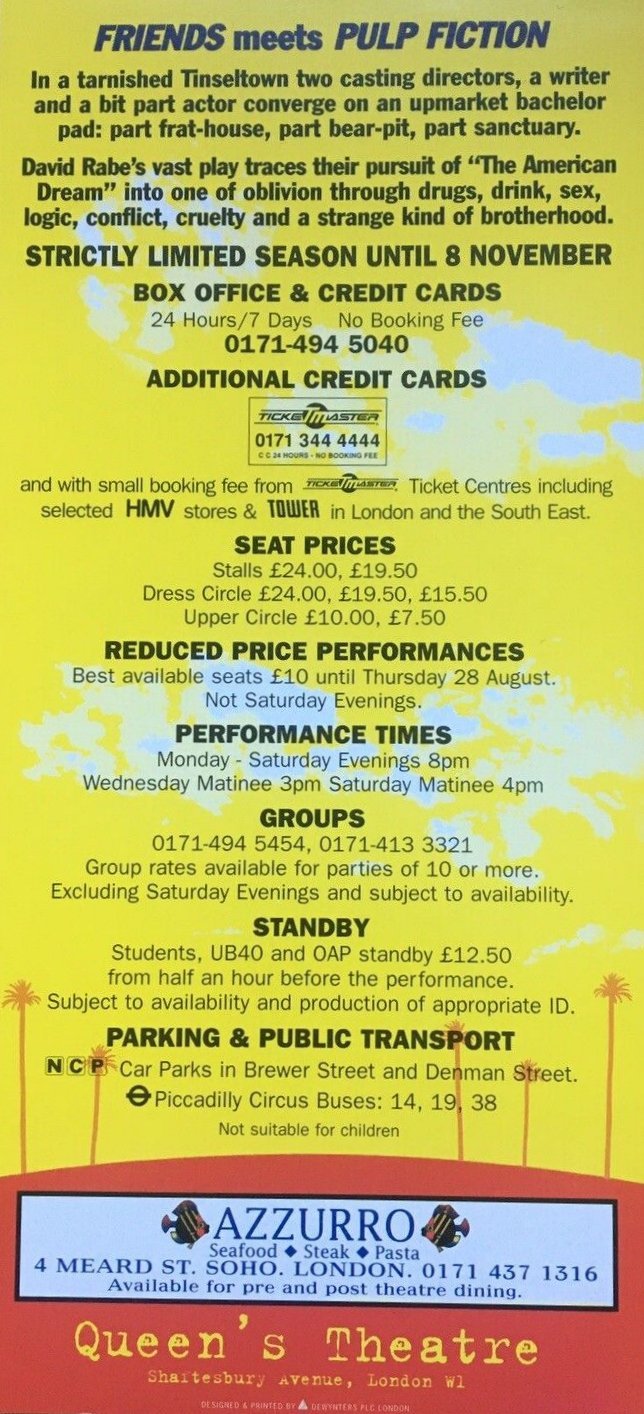
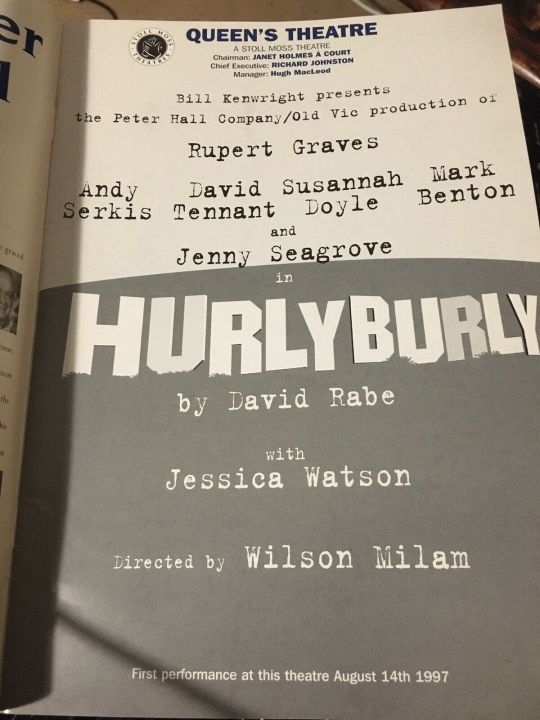
But what's Hurlyburly about? Set in the Hollywood Hills during the excesses of the 80s, it centers on divorced Hollywood casting directors Eddie and Mickey, and their associates Phil and Artie. In six scenes across the space of twelve months, they hurtle towards self-destruction.
These men hate everything: themselves, their friends, the movie industry, and especially women. Their language pours out in crude torrents of hostility and violence. They snort lines, drink, mistreat women, and shout at each other. A LOT. The women in their lives are just there to use and discard. Their girlfriends are annoying props, other women are sex objects or boring and pitiful, they've abandoned their children, and their ex-wives are the focus of undying and vicious disdain.
The production got rave reviews, and Rupert Graves was nominated for the 1998 Laurence Olivier Award for Best Actor. David also got great reviews! His Mickey made an impression as a "mocking and maddeningly self-possessed," "self-controlled, empty" and "cynical outsider". He thought himself a charming God's gift to women type, but had a "detachment that becomes chilling."
Given the amount of photographs taken from the Old Vic run of Hurlyburly, you'd think there would be more photos taken from its Queen's run featuring David. But…no? There's only this one from the programme, and one of him in a blue shirt:
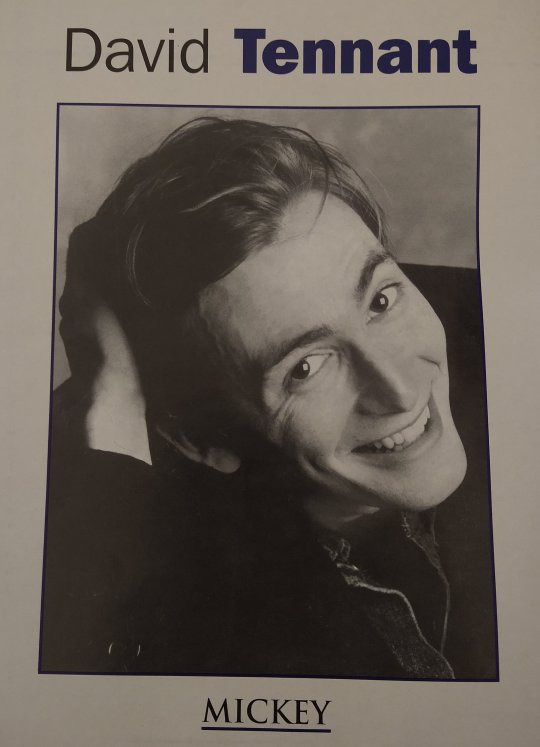
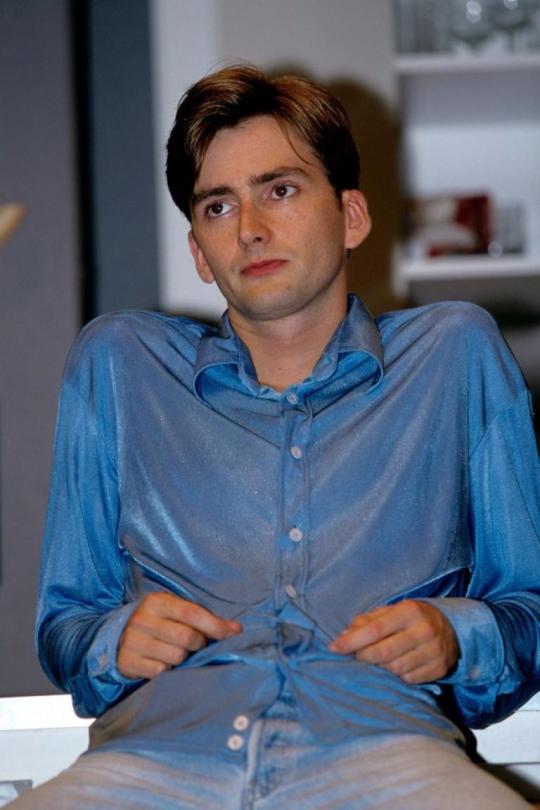
Now for some Trivia Time! During Hurlyburly's run, its assisant director, Charlotte Bond, asked David for a favor. She was going to be involved in a play later that year at the Edinburgh Festival called Tamagotchi Heaven and she wondered if he'd be willing to film a small cameo role for the piece.
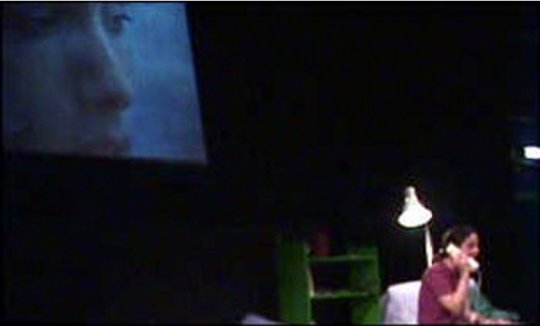
He agreed, filmed it in about an hour, and promptly forgot about it - until a 2008 Chain Reaction radio interview he did with Catherine Tate reminded him of it. Because she'd SEEN it, and somehow recognized him from it....even though they hadn't yet met! Here's the interview where they speak of it (it's 2 minutes in):
youtube
And that, my friends, is what I know of the story of Hurlyburly. I hope you enjoyed it!
#Hurlyburly#DavidTennantEarlyTheatre#DavidTennant#TamagotchiHeaven#AsYouLikeIt#GeneralFromAmerica#TheGlassMenagerie#TheHerbalBed#Youtube
12 notes
·
View notes
Text
this post is for a niche audience but i've been thinking about another hundred people from company all day - a song about how people come and go constantly, traversing the same paths without crossing, or suddenly drawn together, then passing back out of your life again, this never ending cycle of arrival and departure, discovery and loss. whispers of what if, what if, what if at every road not taken. another hundred people just got off of the train...it's a city of strangers, some come to work, some to play, a city of strangers, some come to stare, some to stay, and every day, some go away...it's an ode to new york, but like everything sondheim, it's not nearly that simple, because it's also about the human condition. in the middle of the song, bobby sits in the park with kathy, and we know, somehow, that kathy could be the person, maybe should be his person, but they can never say that. they sit together on a bench, everything unsaid, not on the same page, and she says she's like the park, verdant and peaceful in the middle of the bustling city, but forever out of place. he tries to counter, she's like the park because she's lovely. she tells him - very importantly, perhaps the first moment when someone is asserting who he is on his own, not in relation to them, their friendship, what role he plays for them (because bobby is always playing a role for everyone, filling a space, being bon vivant) - that he's a good man, and has meant so much to her. and there's warmth and so much grief in it, her voicing this because he's about to become a part of her past.
"i'm getting married," she says. and sharply, in shock, he responds: "did you just suddenly fall in love?"
she never answers this. it's not the point. she defers she'll be a good wife. "i want real things." as if what bobby is isn't real, isn't possible. it's not her city. she was always passing through, waiting for the train. "there's a time to come to new york, and a time to leave. enjoy your party." it's this quietly devastating thing, walking away and leaving him there to go to a party, where he'll sparkle and amuse and distract, but not be quite real.
it's a major catalyst in the story, but doesn't get as much attention as the bigger moments - the romantic idealism he hits in marry me a little, thinking love can be weightless, without consequence (love me just enough, cry but not too often, play, but not too rough. keep a tender distance, so we'll both be free...we won't give up a thing, we'll stay who we are... passionate as hell, but always in control...how gently we'll talk, oh how softly we'll tread, all the stings, the ugly things, we'll keep unsaid, we'll build a cocoon of lobe and respect, you promise whatever you like, i'll never collect! right?). it's still not real, it's still not the realization he needs to come to, but it's his first imagining of what that might represent.
and then joanne offers him sympathy, and then joanne offers him an affair, and it would be so easy, despite how terrible it would be for them, for everyone they know. she gives him the simplicity, the attention. she says, "i'll take care of you." and bobby says, "but who will i take care of?" it's so achingly clear, when it hits him. when that door comes unstuck.
and it's only that which gets him to being alive. something that isn't simple or easy, but real, even though it means sacrifice and vulnerability and potential pain. someone to hold you too close, someone to hurt you too deep. someone to make you aware of being alive. make me confused, mock me with praise, let me be used, vary my days.
it's such a beautiful slow burn awakening and maturity, all these subtle transformations and realizations that make bobby come to this place where he can step forward to desire something of his own. where he can risk his hand. and it doesn't really start for him until someone else leaves. until the magic of the party is faded, and it's just him alone, blowing the candles out, and deciding to let his guard down.
we don't know what he'll find, who he'll love, what his wanting even looks like. that's a journey he takes without the audience. because he has to do that on his own. the point isn't knowing, the point is that he's finally brave enough to try. every day, some go away, but some people stay. make a wish. want something.
#anyway no one understood humanity like#stephen sondheim#company#bobby is my hobby#sondheim#vary my days#yes this on my mind for reasons but we won't say that <3#a favorite musical of all-time forever
42 notes
·
View notes